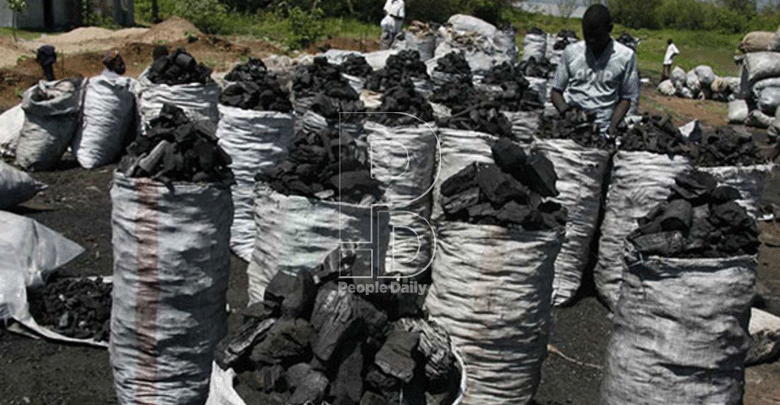Black gold trade thrives despite ban

Milliam Murigi @millymur1
Charcoal trade continues to thrive in the country three years after the government imposed a total ban on its production or transportation, a new report has revealed.
Dubbed Black Gold: The Charcoal Grey Market in Kenya, Uganda, and South Sudan by Global Initiative Against Transnational Organised Crime, the report reveals the market continues to thrive because of the availability of charcoal that is either illegally produced or imported/smuggled from the neighbouring countries.
According to the report, despite the 2018 ban, Kenya is still a producer of charcoal.
Most production occurs in arid or semi-arid areas often in community forests where law enforcement has restricted powers.
However, because of the ban, most people in this business have resulted in importing charcoal from our neighbouring countries.
“Those into charcoal business have switched to import charcoal legally, while others produce charcoal illegally or have become involved in cross-border smuggling, particularly between Tanzania and Kenya,” says the report.
Though the ban has been effective in reducing the volume of domestic production, it also appears to have increased the supply of imported charcoal from neighbouring countries via Kenya.
Consequently, continued regional imports have also allowed illegal domestic production to be laundered into these import flows, as it is not possible to distinguish charcoal from different regions.
Flouted rules
“Kenya imposed a nationwide moratorium in 2018 on logging and timber harvesting that ultimately prohibited production or transportation of charcoal in the country, but this moratorium did not extend to imported charcoal.

That is why the charcoal trade continues in Kenya,” reads part of the report.
The report reveals the high demand for charcoal for consumption as well as for exportation has also led to the emergence of a ‘grey market’ in charcoal, where laws or regulations are flouted at some point in the value chain, but where the final sale is not strictly illegal.
In addition, the charcoal trade is largely perceived as socially acceptable as it concerns a vital basic commodity, even if some aspects of the value chain may be unlawful.
According to the report, legislation attempting to regulate or even outright ban the charcoal trade has shaped the system of charcoal flows across the region.
Kenya has become a major exporter of charcoal to the Middle East (where charcoal is used to light hookah pipes, rather than for cooking).
Until as recently as 2018, Somalia was the major exporter of the region’s charcoal to the Middle East, with the extremist group al-Shabaab capturing some income from this through levying taxes on goods passing through its territory.
However, this situation has now largely stopped due to al-Shabaab’s diminished territorial control.
“The absence of an absolute prohibition on all stages of the value chain is why we are talking about ‘grey’ rather than ‘black’ charcoal markets.
Prohibition is the creator of the illicit and the illegal, it is the single greatest factor behind the development of illicit markets,” reads the report.
This is because prohibiting something does not stop the demand for the prohibited item.
Instead, it simply displaces trade and consumption of the item from the licit economy to the illicit.
Prohibition also tends to raise the price of the illegal commodity, effectively increasing profits for market players.
According to the report, the importation of charcoal and its onward transport and sale remains legal in Kenya.
Because of this, domestically produced charcoal is often claimed to be imported for transporters or retailers to avoid confiscation, even though those loads mostly lack the correct certification.
Hefty bribes
To avoid confiscation, those found without correct certification, always part with some money to bribe the policemen.
A 200-bag truckload can incur as much as Sh100,00 in police bribes on the way to Nairobi from the Busia border, but this is still a small price to pay in relation to the potential.
“Nowadays it is often more desirable for transporters to carry Ugandan charcoal in Kenya as it is often accompanied by a certificate of origin, which serves as protection against confiscation and/or extortion,” says the report.
Speaking during the launch of the report, Michael McLaggan one of the report authors said that although Kenya has regulations that specifically address the production of and trade in charcoal, due to weak enforcement capacity, such laws often exist in words but not in deed.
Illegality often concerns only one point in the value chain such as production, or perhaps transport of domestically produced charcoal but by the time charcoal has reached large urban markets it has been successfully merged with licit forms of trade and cannot be identified as an illegal commodity.
“Because of this, there is a need to harmonise and improve regulation at all levels. Measures to improve governance and regulation need to happen at the local (charcoal producing) level, in national fora, and regionally.
This last level the region is particularly important to prevent national and local measures having unintended consequences for neighboring countries,” he says.












